Flat Lying Trammel Set
All In One – Trammel Compass, Marking, Mortise & Cutting Gauge
ETA Tuesday, 8th Jul
| Ships From: | |
|---|---|
| Currency: | Prices shown in £ British Pounds |
| Returns: | Returnable within 30 days of receipt |
| Payment: | Secure transaction |
Marking & Measuring Bundle: FLTS + P2P + PB
| Qty | Product | Usual |
|---|---|---|
| 1 | Flat Lying Trammel Set | |
| 1 | Point 2 Point Layout Divider | |
| 1 | Perfect Butt Profile Scriber |
£55.61 £46.34 Inc. VAT
£68.85 USUAL PRICE
£13.24 SAVING
Accurately mark or cut arcs, circles & parallel lines
Need to draw a circle? or rather… Need to draw an accurate circle? One where the finishing point actually meets the starting point? M.POWER’s Flat Lying Trammel Head Set will guarantee you exactly that. Simply clip the two Trammel Scribe heads onto any length of steel or Aluminium Rule from 6 inch to 6 feet in length. Choose the pencil or the hyper fine cutting blade and strike that arc.
Trammel Bar Compass vs. Flat Lying Compass, let’s compare
Have you ever tried to draw an arc or circle with a radius nearly as long as your reach with trammel points? Due to the vertical orientation of traditional trammel points, while marking or scribing an arc or circle they must be held perpendicular (90-degrees) to the work piece at all times to ensure accuracy and precision, and if the blade to which you’ve secured them flexes a bit, your arc or circle is no longer true, and if the blade lays over (such as when you’re off-balance from having over-extended your reach) you may get a wild mark or no mark at all as the blade flexes and the focal trammel point slips out of its hole. Unless you have really long arms and a super-rigid rule, it’s usually tedious, aggravating, and inaccurate.
Can you see where laying the rule’s blade flat to the table top would solidify both the length and position of the marking apparatus? M.POWER’s Scribe Heads have been designed to lay flat on the work piece, making them inherently stable, consequently giving you much more precise and consistently accurate marking of arcs and circles.
1. Large and Small Circle Marking
How big or small do you need to go? M.POWER’s heads attach to any standard steel or aluminum rule; hence, the size of the radius you can mark is only limited by the length of your rule. Simply lock one scribe unit in place, measure out the required radius between the scribe point and pencil point and lock the second scribe unit.
2. Marking Gauge
We all like marking gauges until they slip in soft grain or spalting or stick in a knot and make a wild mark, at which point we realize that it’s not the gauge we like, it’s only our expectation of the gauge.(Sounds like dating, doesn’t it?) The problem with standard marking gauges is that you apply force perpendicular to the pivot point created by the gauges scribe, which is supported by nothing but the resistance of the wood to the scribe point, so if the point buries and sticks, your hand has a tendency to keep moving. Simply put, they wobble, are difficult to master, and don’t make woodworking easy or fun because the leverage is all wrong and the scribe point is unsupported, so a material flaw or an untimely sneeze can quickly make a mess of your work piece. Adding a Tri-Scribe unit to a standard try-square or combination square transforms it into a very accurate and stable marking gauge because the forces in the marking unit are now parallel instead of perpendicular. Since the trammel heads will hold your choice of a scribe, pencil or blade, it is a both a marking and cutting tool, versatile, accurate, and simple to use.
3. Mortise Gauge
Need two parallel lines? Precision in joinery is key so why not use a tool you know will give you the most precise results? Attach both Scribe heads to your try-square or combination square as a mortise gauge. Again the strengths of this over a traditional gauge hold true, offering increased stability, accuracy and ease.
4. Panel Gauge
Do you use much sheet stock? These days it’s difficult to avoid, because the materials are of such good quality and being able to design a table or panel without having to leave slop in your design to allow for wood movement is just too good a prospect to pass up most of the time. Most traditional marking gauges have a limited maximum range (6″-7″ / 150mm-180mm) which means you must also have a panel gauge should you need to do any deep-range marking. Aside from the tendency of panel gauges to have all the weaknesses of a marking gauge amplified in their larger size, this is an additional cost and tool to store in the workshop or carry on site. By attaching the Tri-Scribes to a longer blade try-square or combination square you can mark panels with the same accuracy and ease that you mark mortises, tenons, rabbets, etc., and you don’t have to buy, store or carry an extra tool to do so.
5. Cutting Gauge
Do you sometimes need, or simply prefer, a blade instead of a pencil line? We’ve got you covered there, too. The Blade post is included in the kit and creates a cutting gauge that can cut parallel lines and circles. Add another for Japanese-style mortise marking with a knife. Ideal for trimming veneers and cards precisely, the Tri-Blade also allows very fine and accurate marking lines to be cut. This ability can be very useful when marking across the grain where a precise cut is more appropriate than a torn scribing line.
6. Blade Kit – Tri Blade
For precision marking where a pencil line just isn’t fine enough, The FLTS includes a blade post and a bar of replaceable blades allowing you to strike a hyper fine line. Used when set up as a trammel compass and accurate circles can be cut out in veneer, light card and paper.
To change the blade simply undo the pinch screws with the allen key provided, snap off a fresh blade section, slot in and re-tighten.
Hands Free Stability.
Flat Lying positioning.
Self supporting assembly.
Quick setting “Lock and release”.
Utilizes either a steel or Aluminium shop rule.
Low centre of gravity.
Virtually unlimited radii.
Versatile – Acts as a deep range marking gauge.
Versatile – Acts as a Mortise Gauge.
Work to a Pencil line or a hyper fine cut-line.
Stock Fence Contact and Stability:
Have you ever considered the geometry of a marking gauge or cabinet maker’s scribe? It’s no wonder they are so unstable. Think of the fence as a “tic-tac-toe” board, divided into nine roughly equal areas. The post comes out of the middle square, and the work piece rides along the bottom three squares. Hence, only 1/3 or less of the surface contact area of traditional marking gauge fences is actually touching the work piece. The depth-range to fence-width ratio is also poor. Ordinarily the rule of thumb here is your fence-width should have at least 1/1 ratio with the depth-range. Beyond that range the fence-width does not provide enough guaranteed stability for precision accuracy. At 2¼” fence-width most marking gauges will be prone to wobbling at just over 2¼” deep, and that’s if you’re working a material that is perfectly consistent in texture, which by its very nature, wood is not. Also note that a marking gauge is configured as a lever, with both the fence and scribe point as potential fulcrums. As long as the fence is the fulcrum, everything is fairly smooth, but if the scribe point digs in enough to become the fulcrum, where the force oscillates between sheer (pushing or pulling in line with the mark, with the fence as the fulcrum) and moment (pushing or pulling in an arc, at odds with the line, with the scribe point as the fulcrum) until forces regain balance or you react reflexively and stop the cut. What a mess! By attaching the Trammel head to a try-square or combination square you increase the fence-width and also the contact area with the work piece, and you guarantee that the force applied will be parallel to the desired mark. This makes marking more stable, precise and easier for you to do accurately.
Fits any length of Steel or Aluminium Rule
Max Rule Thickness: 2.0mm (5/64″)
Max Rule Width: 50mm (2″)
| MPOWER | yes |
2 x Quality die cast electro coated trammel heads
1 x Carbon steel pivot point for durability
1 x Pre-set angled steel blade Post
6 x replacement blade segments
1 x Allan key
1 x “H” Pencil

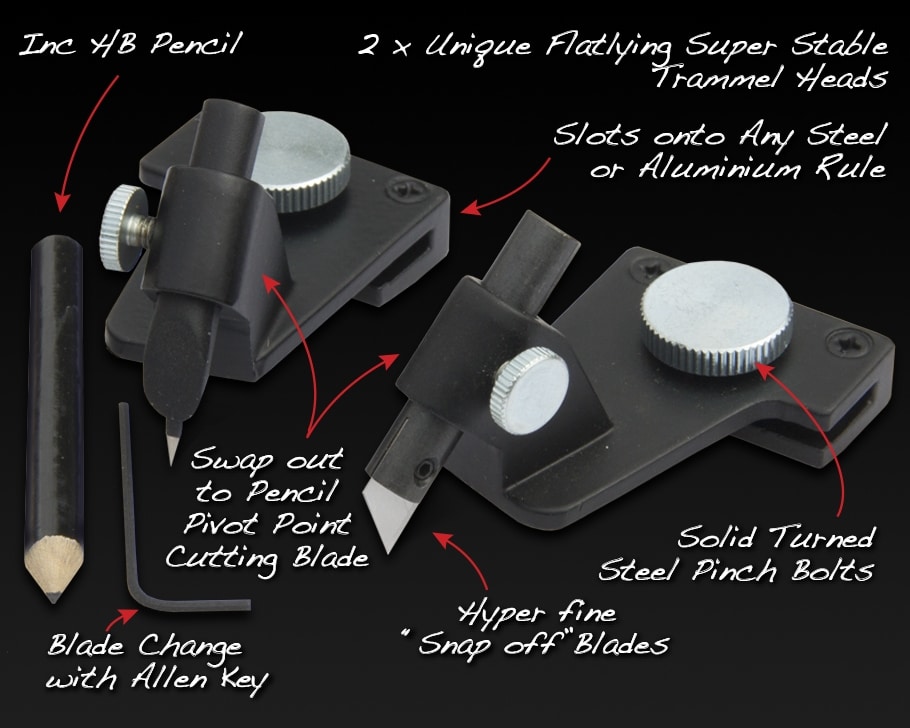
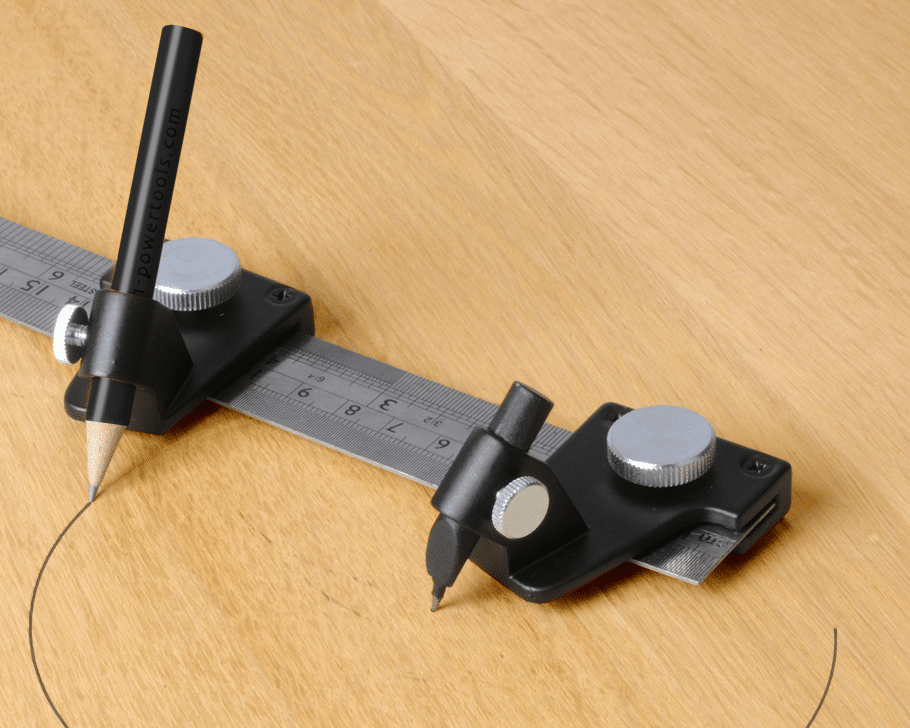
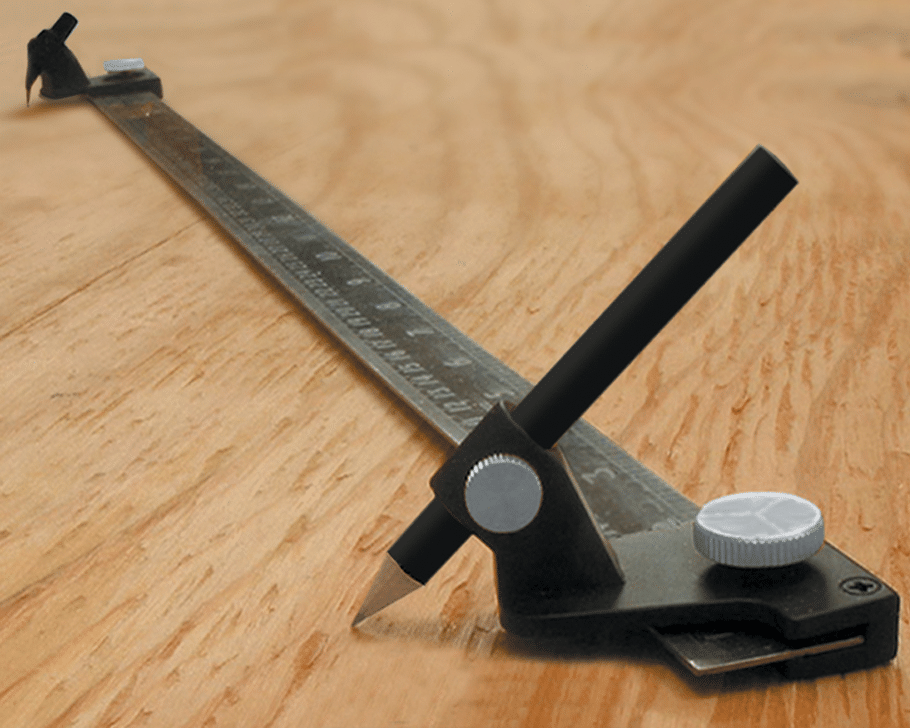
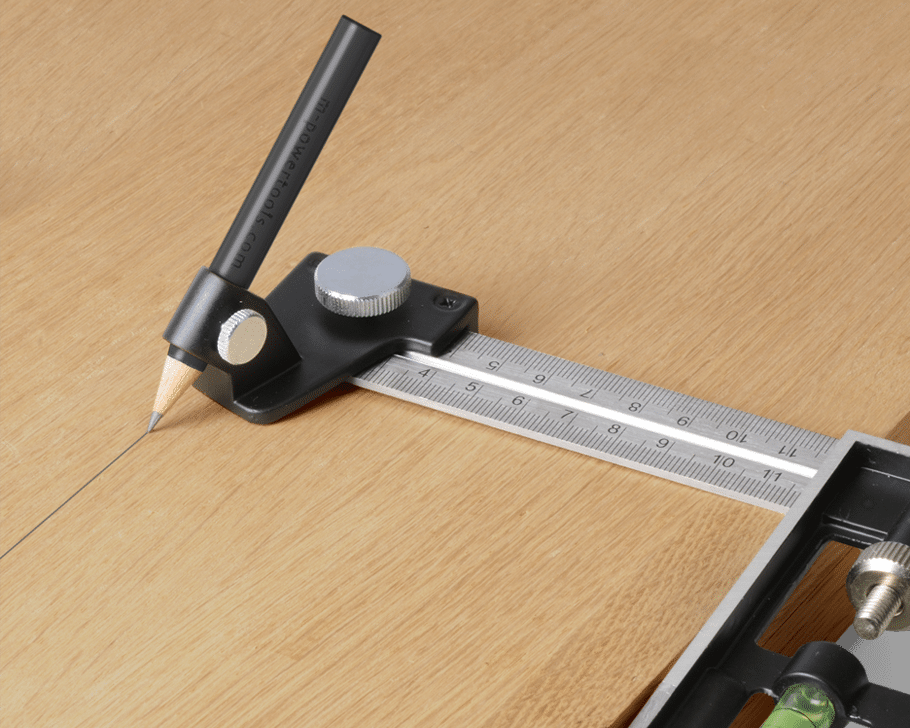
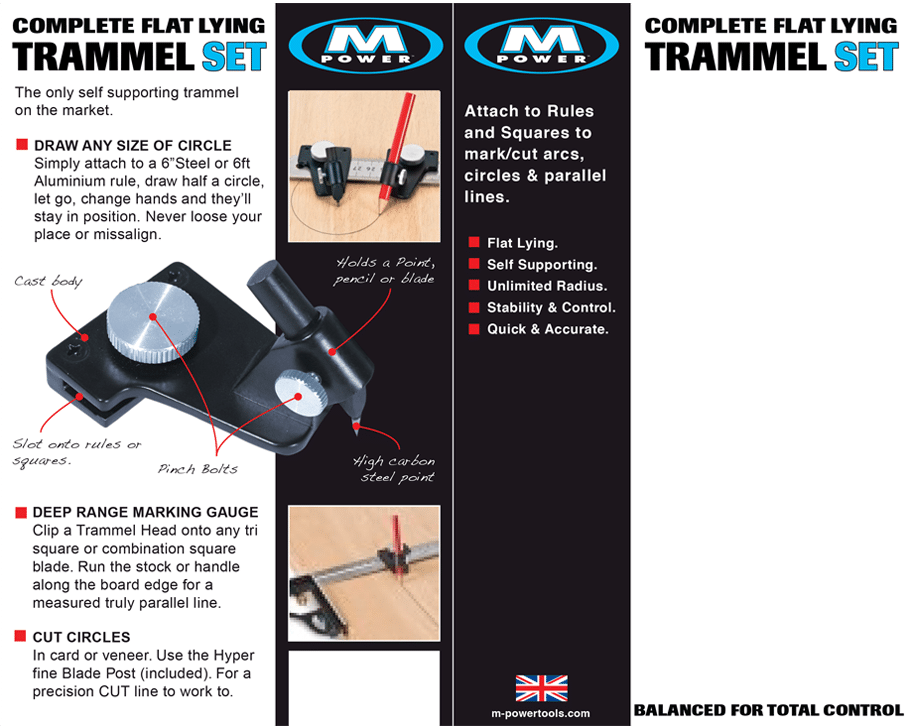


Jeff Mason –
Excellent service,rang up with a couple of questions,which were answered promptly,went ahead and ordered the CRB7 bundle kit online Tuesday 27 th Feb,delivered 28th Feb,what service,thank you.
Warren James –
Well made tool, will keep it in the top drawer.
Jim – Parts Express –
Big Protractor – good quality, lots of little extras that make it nice. did have to get a good quality ruler!
W. T. T – Via Rockler –
Just what I was looking for. – Combined with thin metal rules of 18″, 36″, and 48″ I should be able to scribe arcs and circles of any size that I wish in metal or wood.
Eric Van – Via Woodcraft –
Works Great! – I have not had any issues with this item. It is a great value considering the cost of other products that provide the same function. I have used it many times now on several different lengths of rulers.
Rob – Via Woodcraft Supply –
Simple easy to use – This works great. Just need to remember that it does not come with the bar. Uses the bar out of your tri-square.
Little Mike – Via Amazon –
Radii any size you want – As an old chief draughtsman I like gizmos like this. Well thought out, simple in concept, it works.
Hav’nt used it for the job I bought it for, but have tried it on my 1 metre steel rule for fit, will do just fine.
Will swing an arc from 0 to infinity as long as you’ve a beam that long.
Parts Express customer –
Works as advertised – Appropriate length straightedge. Trammels are far easier to use in the shop than a compass, and this one is very well made.